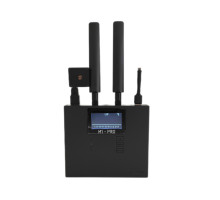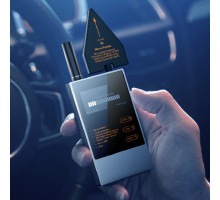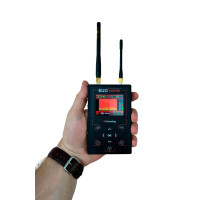









The Analyzer is designed to detect and localize eavesdropping devices that are galvanically connected to power mains and low-current cables.
In the ST 301, passive and active modes of operation are used to detect enabled, switched off, or faulty eavesdropping devices.
Application
Functionally the Analyzer consists of four components (DEVICES):
1. LOW FREQUENCY AMPLIFIER (LFA)
2. WIRE RECEIVER (WR)
3. NON-LINEAR JUNCTION DETECTOR (NLJD)
4. REFLECTOMETER (REF)
| Height | 165 mm |
| Width | 98 mm |
| Thickness | 40 mm |
| Weight | 470 g |
Delivery set:
1. Main unit
2. Charger of the main unit
3. Flash card
4. Mini-USB patch cord
5. Television splitter
6. Headphones
7. Adapter for testing of the power mains
8. TV(m)/F(m) adapter
9. TV(f)/F(m) adapter
10. TV(f)/TV(f) adapter
11. RJ11 (1/2) splitter
12. RJ45 (1/2) splitter
13. RJ11 socket
14. RJ45 socket
15. RJ45 short-circuit socket
16. Adapter and screwdriver for connecting to the multi-wire cable
17. Cable storage bag
18. Television cable TV(f)/TV(m)
19. Patch cord RJ45/TV(m) for connecting to the TV socket TV(f)
20. Patch cord for connecting to the RJ45 PC socket
21. Patch cord for connecting to the RJ11 telephone socket
22. Patch cord with a needle for connection to the cable shield
23. Case
Functionality:
- detection and the analysis of signals cable (dynamic and electret) microphones in low-current cables;
- activation of electret cable microphones by giving to the cable of bias voltage for their detection;
- detection of signals of the eavesdropping devices transferring information on power mains and low-current cables in frequency range of 100 kHz - 180 MHz;
- detection of unauthorized galvanic connections to the cables using a NLJD and the REF;
- measurement of AC and DC voltage in the low-current cables.
|
LOW FREQUENCY AMPLIFIER (LFA) |
|
|
Frequency range, Hz |
20 - 25000 |
|
Input resistance, kOhm |
200 |
|
Adjustment range of gain, dB |
0 - 60 |
|
The maximum signal amplitude on an input, V |
10 |
|
Spectral density of noise voltage, nV/Hz |
6 |
|
Bias voltage values, V |
0, ±5, ±10, ±15, ±20, ±26 |
|
Form of representation of a signal |
Oscillogram Spectrogram |
|
Measurement range on a direct current, V |
±80 |
|
WIRE RECEIVER (WR) |
|
|
Frequency range, MHz |
0.1 - 180 |
|
Time of scanning of all range, sec |
0.3 - 1 |
|
Minimum level of detected signal in AUTOMATED mode, dBm |
-60 |
|
Dynamic range, dB |
50 |
|
Input resistance, Ohm |
50 |
|
Demodulation |
AM, FM |
|
Bandwidth of the filter, kHz |
180 |
|
The maximum allowed voltage in the cable, V |
250 (AC),80 (DC) |
|
Data representation form |
Spectrogram Oscillogram Table |
|
NON-LINEAR JUNCTION DETECTOR (NLJD) |
|
|
Level (amplitude) of the probing signal, V |
±14 |
|
Frequency of the probing signal, Hz |
60 |
|
Separate indication of even and odd harmonics |
yes |
|
Minimum detectable level of non-linear distortion, % |
0.1 |
|
REFLECTOMETER (REF) |
|
|
Range of distances, m |
3 - 150 |
|
Error of measurements, m |
±0,6 |
|
The ability to work on cables under voltage |
no |
|
Power supply |
|
|
The built-in lithium-polymer accumulator, V |
3.7 |
|
Power consumption, W |
<1 |
|
Operating time at the maximum power consumption, hour |
>3 |
|
Charging interval of completely discharged accumulator, hour |
5 |
|
Weight and dimensions |
|
|
Dimensions of the main unit (length, width, height), mm |
165 x 98 x 40 |
|
Mass of the main unit, kg |
0.47 |
|
Packaging dimensions (length, width, height), mm |
390 x 310 x 170 |
|
Mass of the kit in packaging, kg |
4.4 |
There are no reviews for this product.
No questions about this product.





